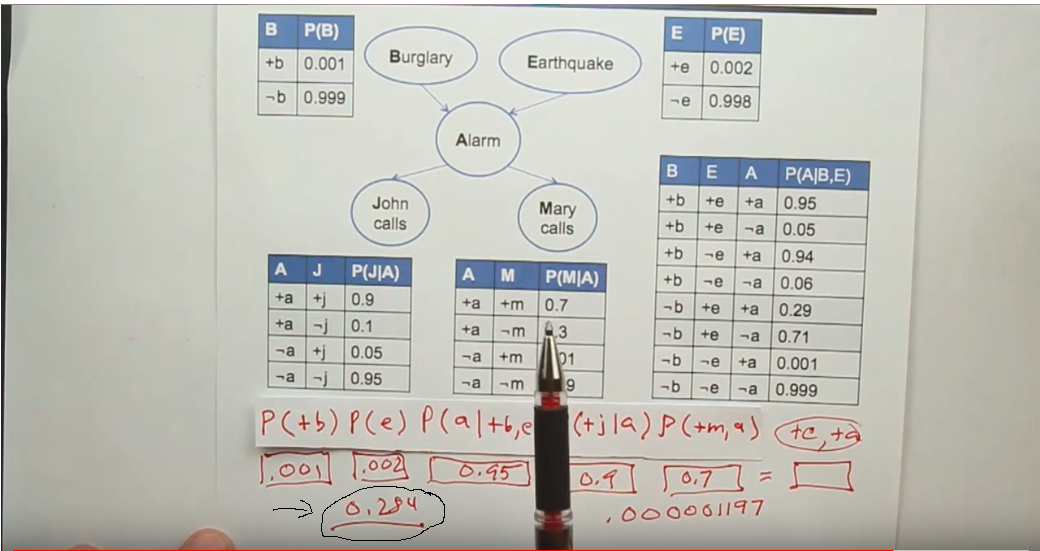Your video shows the answer to the question posed in this video: https://www.youtube.com/watch?v=q5DHnmHtVmc
The question is phrased in a slightly confusing way, but the lecturer asks for the following (using his notation):
$$P(+b | +j, +m) = \frac{P(+b, +j, +m)}{P(+j, +m)}$$
He explains that the numerator of this fraction is equal to
$$\sum_e \sum_a P(+b, +j, +m, e, a).$$
Using the Bayesian network structure, this equals
$$\sum_e \sum_a P(+b)P(e)P(a|+b,e)P(+j|a)P(+m|a).$$
The number he calculates in his video is the term where $e = +e$ and $a = +a$.
To get the 0.284 at the end of the video, you need to compute the other three possibilities (i.e. $e = -e$ and $a = +a$, $e = +e$ and $a = -a$, $e = -e$ and $a = -a$) and add them all together. Then we need to divide by $P(+j, +m)$.
$$P(+b)P(+e)P(+a|+b,+e)P(+j|+a)P(+m|+a)= 0.000001197 \text{(as in the video)}$$
$$P(+b)P(-e)P(+a|+b,-e)P(+j|+a)P(+m|+a) = 0.001*0.998*0.94*0.9*0.7 = 0.0005910156$$
$$P(+b)P(+e)P(-a|+b,+e)P(+j|-a)P(+m|-a) = 0.001*0.002*0.05*0.05*0.01 = 5*10^{-11}$$
$$P(+b)P(-e)P(-a|+b,-e)P(+j|-a)P(+m|-a) = 0.001*0.998*0.06*0.05*0.01 = 0.00000002994$$
Adding these all together we get $P(+b, +j, +m) = 0.00059224259$.
Now we need to calculate $P(+j, +m)$. Unfortunately, this is even more tedious to compute, as we have the following:
$$P(+j, +m) = \sum_b \sum_e \sum_a P(b, e, a, +j, +m) = $$
$$\sum_b \sum_e \sum_a P(b)P(e)P(a|b,e)P(+j|a)P(+m|a)$$
so we need to take the expression $P(b)P(e)P(a|b,e)P(+j|a)P(+m|a)$, enter all possible values of $b, e,$ and $a$ and add all the results together. This is a sum with eight terms. Four of those are the same as the four that we computed before, so now let's compute the other four. These correspond to the cases when $b = -b$.
$$P(-b)P(+e)P(+a|-b,+e)P(+j|+a)P(+m|+a) = 0.999*0.002*0.29*0.9*0.7 = 0.0003650346$$
$$P(-b)P(-e)P(+a|-b,-e)P(+j|+a)P(+m|+a) = 0.999*0.998*0.001*0.9*0.7 = 0.00062811126$$
$$P(-b)P(+e)P(-a|-b,+e)P(+j|-a)P(+m|-a) = 0.999*0.002*0.71*0.05*0.01 = 0.00000070929$$
$$P(-b)P(-e)P(-a|-b,-e)P(+j|-a)P(+m|-a) = 0.999*0.998*0.999*0.05*0.01 = 0.000498002499$$
Now the sum of all eight terms equals $0.002084100239$, and thus we have
$$P(+b | +j, +m) = \frac{P(+b, +j, +m)}{P(+j, +m)} = \frac{0.00059224259}{0.002084100239} = 0.284$$

